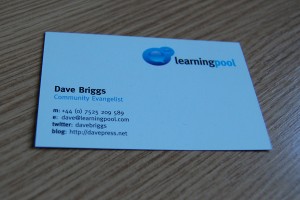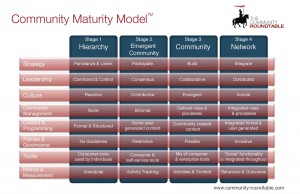 My role at Learning Pool is a hard one to define exactly. A couple of weeks ago, we had a big company meeting where everyone got together to discuss the last year’s efforts, and what we want to achieve in 10/11.
My role at Learning Pool is a hard one to define exactly. A couple of weeks ago, we had a big company meeting where everyone got together to discuss the last year’s efforts, and what we want to achieve in 10/11.
At one point Paul asked everyone in the room to raise their hands if they knew what I did for the company. I don’t think anyone raised their hands. I know I didn’t.
That’s ok, though, and I stood up and rather incoherently tried to explain it all. I don’t think I did a great job, but I do think I managed to get across that it isn’t just about going to conferences.
My job title is Community Evangelist, and the first thing to say is that I’m not a Technology Evangelist. The role of technology evangelist is a pretty well established one in the techie sphere, pioneered by Guy Kawasaki at Apple in the 80s. Robert Scoble fulfilled a similar role for Microsoft in the mid-noughties.
This is important, because I’m a newcomer to Learning Pool’s core technology, based on Moodle, and would probably be a pretty terrible evangelist for it. Not only that, but my actual technical knowledge is sketchy at best, and I’m as good an example as any that a little knowledge can be a very dangerous thing.
Instead of technology, my focus is people – as individuals, members of communities of practice or interest, and organisations. My aim is to promote the behaviour and culture of the internet: collaboration, openness, generosity, curiosity.
So what do I actually do?
- Well, I do go to conferences. I speak at them, sit and listen at them, wander around chatting to people at them. I collect business cards, I give out my own. I enthuse about the wonders of the internet and what it can do for people and organisations.
- I also turn up at organisations, like Councils – occasionally invited – to talk to groups of people, whether management teams or whole departments about the work we do and why it’s important
- I manage communities. This will be really important once the new LP website is launched, which will be full of online networking goodness. Encouraging participation, getting more people to join, providing real value for both members and for the company.
- I convene. One of the things Learning Pool effectively invested in when they recruited me was my network: as a result of the past 5 years I’ve spent writing this blog, whoring myself on Facebook and Twitter and attempting to be as helpful as possible, I’ve built up a group of people who find knowing me occasionally useful. I introduce people who may not have otherwise known one another, and hope that interesting things happen as a result.
- I curate. I spend a lot of time following hundreds of blogs and Twitter streams, picking out the best bits and distributing links to them via Twitter, Delicious, Google Reader, and of course this blog. As I like to say, I find this stuff so you don’t have to.
- Of the stuff I read, a lot comes from sectors other than the public, and so I spend time thinking how emergent technology and ideas can be applied to public services. I guess I just put stuff into context. It isn’t that hard, and the joy of it is that I don’t need to have too many original thoughts of my own.
- I write longer pieces than blog posts, like the Twitter guide – and I have some more of these planned. Hopefully they are useful for those that download and read them, and they promote LP as a helpful company who know more or less what they are talking about
- I have ideas. 99% of them are stupid and never go anywhere. The other 1% are stupid but get made less stupid by someone else, and may end up actually happening.
- I get wind of potentially interesting projects for Learning Pool to be involved with, which are often way outside the usual day to day business of the company. I do my best to win the work, and after completing it, we decide whether it is an activity that could be ‘productised’ and marketed as a service we could offer more widely.
- Finally, I share stuff. Pretty much everything I ever think gets written up and published, whether here or on Twitter. I also try to share the interesting stories I come across in local government, finding the pockets of great innovation that are going on and making more people aware of it, so everyone benefits. My recent interview with Mark Lloyd is an example of that. I’m always looking for more.
So that’s a brief run through of what I do. In practice, I spend a lot of time reading, mainly off the screen and mainly within Google Reader, and a lot of time out and about meeting people. There are worse ways of making a living.


 I’m interested in how the various strands of discussion can be tied together to bring down the levels of duplication, reduce the noise levels and allow people to involve themselves in projects that interest them while making the most of what is happening elsewhere. This is very much the thinking behind the
I’m interested in how the various strands of discussion can be tied together to bring down the levels of duplication, reduce the noise levels and allow people to involve themselves in projects that interest them while making the most of what is happening elsewhere. This is very much the thinking behind the